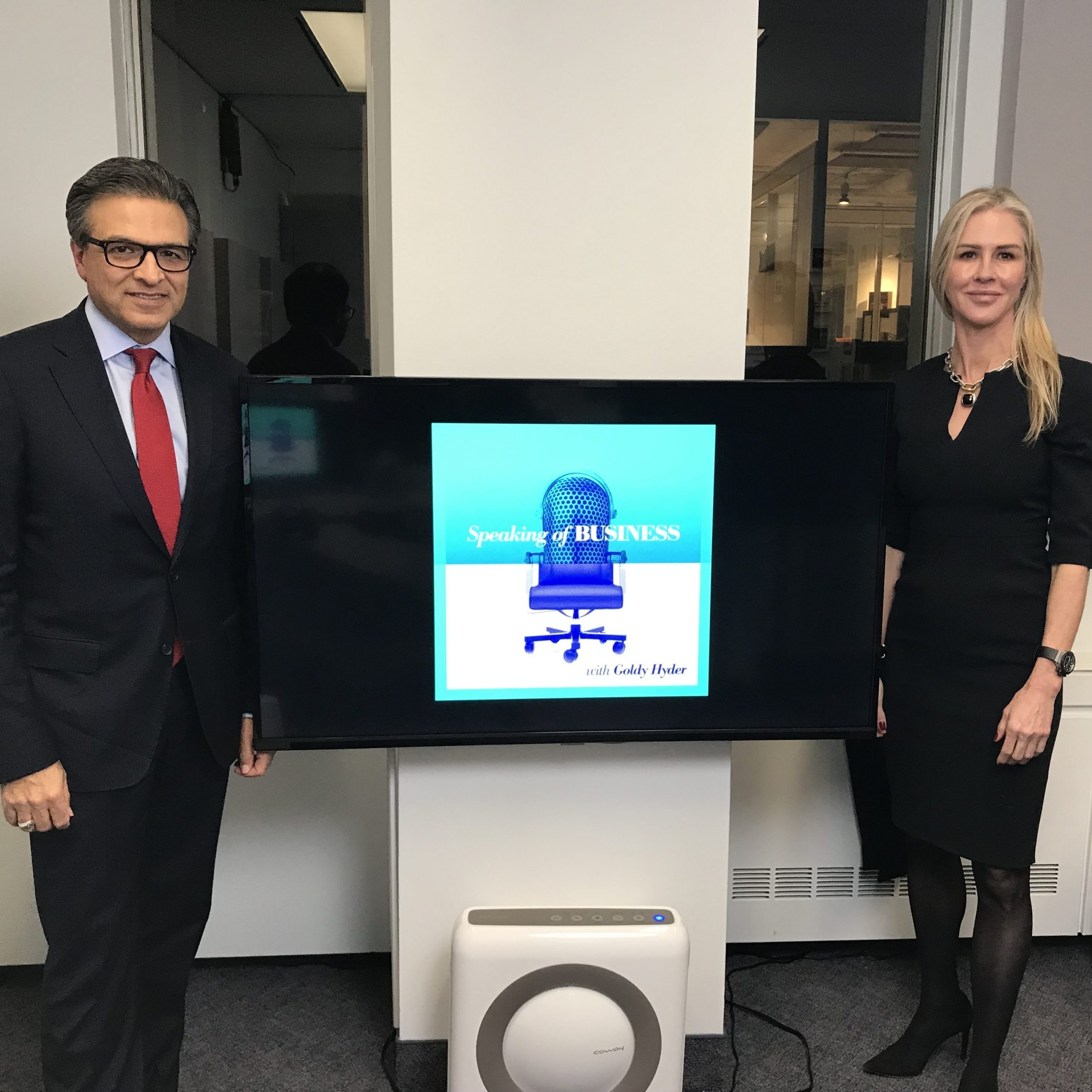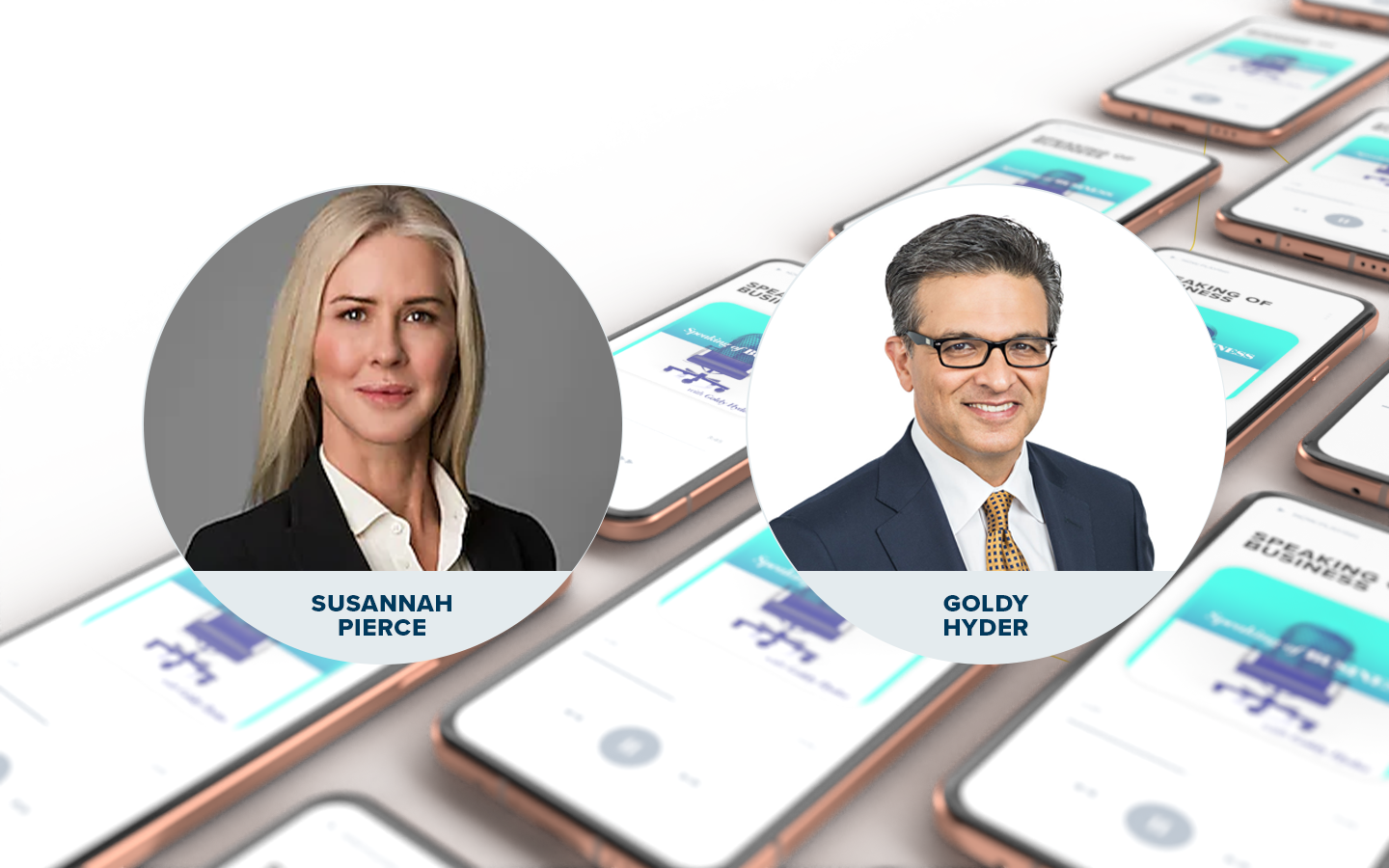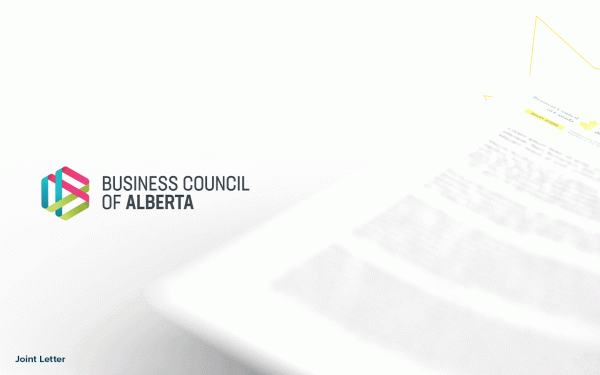“We have a common goal” – Shell Canada and the clean-energy transition
When Susannah Pierce looks to the future, she’s filled with optimism. Why? As she puts it, “the energy sector is changing, from one of being carbon-intensive to one of being more [focussed on] clean energy.”
The President and Country Chair of Shell Canada points to innovation and investments in new technology by Shell and others – including renewable fuels, biofuels and carbon sequestration – as significant steps toward helping Canada meet its net-zero commitments.
She also recognizes the need for the private sector to work with all levels of government to reduce emissions.
“Standing on opposite sides, fighting over things, is never going to allow us to move forward,” she says in conversation with Goldy Hyder on the Speaking of Business podcast. “The challenge is real, but the solution is one that we have to work on together. Let’s make sure we roll our sleeves up collectively and get after it.”
Listen to Susannah Pierce’s conversation with Goldy Hyder, including her thoughts on supporting women in the workplace, on the Speaking of Business podcast.

Latest Podcasts
Transcript
Susannah Pierce:
We need to all come together and say the challenge is real, but the solution is one that we have to work on together. And so let’s make sure we roll our sleeves up collectively and get after it.
Goldy Hyder:
Welcome to speaking of business conversations with Canadian innovators, entrepreneurs, and business leaders. I’m Goldy Hyder, president and CEO of the Business Council of Canada. Last month, world leaders met in Glasgow for the 26th United Nations Climate Change Conference. The goals of COP 26 were ambitious, and the message was one of urgency. Delegates were asked to find agreement on limiting global warming to 1.5 degrees above pre-industrial levels. How to achieve that though was a lot less clear. The ambition and the urgency didn’t begin or end with the COP 26 meeting. It has frankly been the preoccupation of many Canadian businesses for years. That includes Shell Canada, but can an energy company heavily invested in oil and gas, be a part of Canada’s climate change solution? My guest today thinks so. Susannah Pierce is the president and country chair for Shell Canada. She’s also manager of renewables and energy solutions. Welcome Susannah.
Susannah Pierce:
Thank you, Goldy. It’s great to be here.
Goldy Hyder:
And we’re here in person, so it’s great to have you here in person. There’s life after. It’s wonderful to be with others in the same room. We’re taping this, I guess we’re speaking at the end of November, we’ve just seen what British Columbia has experienced, devastating, deadly floods, and landslides. And there have obviously been supply shortages, including fuel. Wondering, how are you responding and then what do you think we need to take away from this?
Susannah Pierce:
Thanks Goldy. Well, first of all, I was in British Columbia when we had these atmospheric rivers. In fact, there’s been more than one, but this last one was, was truly devastating, because we did see what happened with the mudslides and then the berms breaking and the flooding. I think it is something to pay close attention to, because the extent to which we do have extreme weather events is the extent to which we need to prepare for those. And so I think if anything, it just demonstrates the need to make sure that we are adapting to the potential for extreme weather. So I think there’s definitely some learnings from that. I will say from a supplier perspective, like any crisis, we rise to the challenge and there’s a number of suppliers into British Columbia that bring product from Alberta that also bring product from the United States up to serve the market.
Susannah Pierce:
And that’s all enforced. That’s all happening right now, as much as possible through whatever channels we can get supply to market. So while the Trans Mountain pipeline is down and the rail lines have been down, the suppliers are looking at alternative means. So we’re looking at marine and we’re looking at how we can transport fuels via highways. So if anything, it just demonstrates that the system is working from a supply perspective because we’re looking at all measures. Now you’ve seen the government announce, a requirement that we limit fuels in certain parts of British Columbia to non-essential buyers. So that would be just you and me, if we are wanting to drive our cars. That was a precautionary measure, I think. And, as a result of that, again, I think British Columbians are responding and saying, “Okay, well let’s pay attention. Make sure that fuel is going where it needs to.” So learnings, we need to prepare for extreme weather events. We need to make sure the infrastructure is fit for purpose.
Susannah Pierce:
I think from a supplying the market perspective, it’s another example of where the community of energy suppliers is coming together to find ways of getting product to market. Because it’s not been so much that we’ve had supply shortages. It’s really about having to adapt at different ways of getting the supply to the market.
Goldy Hyder:
Now, we’re going to talk a lot about climate change. I said it in my introduction, but sometimes the attention in climate change is all going to all the innovation stuff and all the cool, sexy things that we need to do to get to where we need to get to. But isn’t infrastructure and particularly, the stuff you don’t even see, like the way our cities can manage flood zones and all of these things, how much of that is at the root of some of these issues? Is our infrastructure itself up to snuff?
Susannah Pierce:
Well, I think that’s a question for municipalities and all governments is how are we preparing for, as I said earlier, extreme weather events and making sure that the right investments are in place. From a climate perspective and that’s climate adaptation, the other piece of this is obviously making sure that your energy systems are changing to decarbonize in line with the Paris Agreement. And that’s the other piece of infrastructure is. What infrastructure is in place today that you can utilize, because it’s not just about throwing out the entire kit. There’s parts of kit we can use today to actually create the renewable fuels whereas formerly we would’ve created petroleum products. And so infrastructure is about how do we use infrastructure, invest in infrastructure for adaptation, but it’s also about how we use existing infrastructure to deliver the lower carbon fuels that are required to manage climate change.
Goldy Hyder:
Now you became president of Shell Canada, really at a pivotal moment for the oil and gas industry. And frankly for Canada, given our natural resource economy. I suspect it’s an understatement to say that Canada’s energy transition is perhaps the challenge of our time. Now in broad strokes, how important is it to get this right?
Susannah Pierce:
It’s a great question. And it’s one which, as a Canadian, I wake up every day thinking about, I think about it from really two lenses. One, as I said, as a Canadian, because I recognize the commitments that Canada has made. I have two young children and the extent to which the climate changes and makes their lives more difficult. That’s a big worry for me. And so that compels me to make sure that I can do what I can to help working with government to address our climate commitments, which then can demonstrate with a credibility and the influence to address the climate commitments of other nations. But from a Shell perspective, what’s interesting for me is that very much the challenge that Shell is under to decarbonize is similar to the country level challenge. And that is, Shell historically has depended upon oil and gas to generate income. Canada to a large extent has depended upon the revenues from oil and gas to generate GDP.
Susannah Pierce:
What we have to do as a company and what we have to do as a country is find pathways to decarbonize to meet our commitments, Shell to meet its commitments to net zero by 2050, leveraging or focusing on scope one, two, and three. And in the country also looking across sectors at how can it decarbonize. And certainly the oil and gas sector is one which has contributed quite a substantial amount of emissions. And so therefore there’s no question why there’s the target in the oil and gas sector. The sector has invested quite a bit in improving its carbon intensity. That is reducing the amount of carbon that is generated by each unit of energy, but clearly more needs to be done.
Susannah Pierce:
And the one thing I will say since having come into this seat nine months ago, is that I’ve been quite impressed by the level of investment that companies are taking or are looking at. And that my company is looking at. In fact, there’s a huge portfolio of opportunities that we’re looking at across our business in Canada. And that’s what also gets me out of bed every day is finding ways of making that happen.
Goldy Hyder:
Tell us more about that. Like what kinds of solutions are you working towards?
Susannah Pierce:
So the first thing that Shell has been looking at is, is clearly when we think about net zero, it’s how do we decarbonize our own footprint? So, scope one and two, and that’s a certain amount of our net zero commitment. 90% of the emissions we need to address in net zero are our customers. So, that’s scope three. So for us, it’s how we are looking at each of these different types of emissions and finding investments that can address each. Now, it’s easier to an extent to address scope one and two, because those are generally within our control. So the emissions that we create when we produce energy products or the emissions that we cause to be created, for example, when we buy power to help our energy systems work. So we can address that through power decisions. We recently announced and investment in a 58-MW solar facility at our Scotford Chemicals and Energies Park. That’s a substantial investment that’ll help us use renewable power for the facility.
Susannah Pierce:
We’re looking at generating biofuels from that facility as well, which will also help us address scope three. But the key thing for us clearly is, how are we going to be able to work with our customers to help them address their emissions? Because if 90% of the emissions we need to address our scope three.
Goldy Hyder:
That’s the consumption, not the production.
Susannah Pierce:
Got it. We can’t just pay attention to the production, the production matters, but the consumption really matters too. And in particular, in the context of our net zero commitments and from a Canadian perspective too, I think it’s important that we are focusing on how do we decarbonize sectors by paying attention to the customers within those sectors who demand the energy products?
Goldy Hyder:
Are you at all concerned that there’s a risk out there that the public doesn’t fully understand the cost of this journey that we’re all embarking upon?
Susannah Pierce:
Yeah, I think there’s no doubt that the public doesn’t understand the cost, frankly. I’m not sure any of us fully understand the cost. What we’re trying to do is to create the right sorts of policy frameworks. We being collectively industry government, others, so that we can incentivize decarbonization in a way that can mitigate the high cost to the end user. A good example would be that today green hydrogen, which is often spoken about, is a premium to what an entity or customer would pay as opposed to using a basic gasoline or diesel product. So how do you get that customer to go from an affordable gasoline diesel product to a green hydrogen product? And in addition to that, invest in the technology that will allow them to use that green hydrogen whether it is a hydrogen truck. All of that has to be addressed as we look at policy frameworks in decarbonization, but we haven’t quite worked that mechanism out yet.
Susannah Pierce:
So, the costs are not yet fully fleshed out, but that is where policy frameworks matter. That is where customers, producers, governments and other stakeholders come together to say, “Okay, well this is the pathway. Okay. And these are the premiums. How do we address that?”
Goldy Hyder:
It’s interesting. When I talk to leaders, the struggle seems to be that it’s a real challenge that when you know what your goal is, you know what your objective is, but in some cases you haven’t got a clue how it is we’re going to get there.
Susannah Pierce:
You’re absolutely right. You may not have a clue to the nth degree of how you’re going to get there. 2050 is a long ways away. When we plan at Shell, we plan about 10 years out and then obviously we tweak every year along the way to that end goal. But what’s interesting this time, which is a little bit different than what we’ve seen in the past is, historically it’s been energy companies setting a target, okay. Shell set a target of 2050. That’s fantastic. But if our customers aren’t setting that same target, it’s very difficult for us to say, “well, let’s invest in creating hydrogen” if the customers aren’t making the same commitments. Well now customers are. So there’s a greater degree of certainty to realize that customers are actually saying we have a net zero commitment too, which means we have to pay attention to what we buy or what’s in our footprint. So now all of a sudden we can have conversations where we haven’t had before. Now 2050 is still a ways out.
Susannah Pierce:
But if your full supply chain is saying, we want to work to get to that same end point, it actually helps a heck of a lot. Because now you have end users saying we want to help you get there. And at Shell, we want to help our customers get there too.
Goldy Hyder:
Now some would say, and some have said that the best course of action is to simply leave the oil in the ground. What do you say to those people?
Susannah Pierce:
Well, if we left all the oil in the ground today, [pause] that’s exactly what would happen. Nothing would really happen because we depend so much on oil-based products today. And so the economy runs on oil. So we can’t keep it in the ground because we still need to be able to supply the economy. We just mentioned what’s happening to British Columbia. So we still need to be able to provide oil today. What we have to do though, however, is recognize how on that pathway to decarbonization oil and the demand for oil may change. And how quickly it will change will really depend upon the governments, the jurisdictions, and how quickly they are helping make that change through regulation. So when we look out into the future as Shell, we do see that in our case, oil has peaked. We believe oil for us has peaked in 2019. We will stop new frontier exploration in the mid part of this decade.
Susannah Pierce:
And therefore we’re not looking to invest in new oil. As a point of fact, oil has peaked. We still believe there’s a role for natural gas, because we still see that there’s a need for gas to provide baseload power in places where renewables are still intermittent and storage is not available.
Goldy Hyder:
See Europe.
Susannah Pierce:
Yes. Well, Europe is an example of something where, again, it’s another great demonstration of supply and demand and the dependence at this stage upon natural gas to help meet demand, particularly, when weather changes. So, supply and demand and markets still really matter. And we need to be very thoughtful about that as we look at decarbonization, because the one thing we don’t want to see happen is that all of a sudden the economy is impacted so severely that it has a negative impact on our ability to decarbonize over the long term.
Goldy Hyder:
And negative impact on support from the public. This is where I keep going back.
Susannah Pierce:
That’s right. And where prices have an impact on public support.
Goldy Hyder:
We’ve got to bring the public along with us, especially since all of you in the business community have made the financial commitments, have made the net zero commitments and are now on a journey that there’s no turning back. And I think that’s a tremendous risk. Now you mentioned your teenage children earlier, and I heard you talk about them and you’ve written about them. When you said that you had thought that there isn’t a future for themselves in your own industry. This the sense of, “I want my kids to grow up to be” type of thing. Where do you see the energy industry going in Canada?
Susannah Pierce:
Well, I’m quite optimistic about it, Goldy and again, I think part of it is the degree of innovation that I see happening, which I think more broadly the public doesn’t really see. But the amount of technology investment that is happening right now to decarbonize, the amount of investment that big players are making in carbon capture sequestration, for example, the opportunities that we see in renewable fuels, whether that’s waste to energy, whether that’s biofuels. And therefore, I think what I am optimistic about is the energy sector is changing from one of being carbon intensive, to one of being more clean energy and clean energy that can be electricity from renewable power, from wind and solar, but it can also be cleaner fuels. And that’s the other piece which I’m quite excited about. So for example, hydrogen blue or green, there’s a great opportunity for hydrogen.
Susannah Pierce:
And this is why you see the emergence of hydrogen hubs in Alberta. And I expect there will be more because hydrogen is something that the harder to electrify and abate sectors are looking towards to help them decarbonize. And so when I think about my kids, it was funny when I was their age, I wanted nothing to do with the energy sector either. In fact, last thing I wanted to be is like my parents and my father who was very much engaged in this sector. But, I found myself coming back to it in part, because as a Canadian, it was something which at the time, many Canadians were quite proud of when I started working on the LNG Canada project. And it created such an opportunity for us to provide gas, natural gas, to parts of the world that really needed it for their own decarbonization. The world has shifted right now and now we need to accelerate and make sure we meet our own climate commitments, but there’s still a role for Canadian energy.
Susannah Pierce:
And so I guess it’s a long way to say my kids are not interested now, but I think they will be interested in the future when they see the role that Canadian lower carbon energy can play in their lives. And, I hope as an export.
Goldy Hyder:
Well, certainly the importance of investment is something else that is going to be key to this transition. And it seems to me that there’s a realization now that to bring down emissions, you actually need to fund the emitters. You need to bring about that innovation. Are you seeing capital form to help do that?
Susannah Pierce:
Yes. I think the opportunity is there for the right types of investments and the measurement, I like to think a little bit about is when you add up all of the energy, which Shell supplies globally, it’s about 5% of world energy consumption is provided by Shell that’s products that we produce or products that we sell for others. So when you consider that breadth, it’s a huge opportunity for us to actually have a real impact on energy and the types of energy that is consumed. And when you offer the ability to decarbonize with customers and partners, there’s great opportunity for that investment, because customers are demanding it and you have the ability to produce it. So I think there’s great opportunity for investment in cleaner energy production.
Goldy Hyder:
Now you’re here in Ottawa. As I said, lovely to see somebody in person at the podcast. You’re here the day that Parliament’s opening and you’re going to spend almost the whole week here. Tell me about the importance of the role of government at all levels in the country. What do you need from them and how is that they and the business community can work together to make this journey a real one?
Susannah Pierce:
Well, I think it’s the most important thing in front of us is making sure that all levels of government and in companies and the non-profit or non-governmental stakeholders come together and make sure that we’re having a real dialogue about the challenge ahead of us. And that challenge really is meeting our climate commitments in a manner that provides for reliable and affordable energy, but that decarbonizes as aggressively as required. So getting to a 40 or 45% reduction by 2030 is no small feat. And, as I said in the Shell context, when 90% of our emissions are our customers, quite clearly, we need to work with our customers to make that happen. Similarly, Canada has to work with all levels of government, customers, and producers and other stakeholders to make sure that we can decarbonize around each of those pathways on a sectoral basis. It won’t happen on its own. And government can be a very important and an influential convening force in this. And that is government convening with other governments, stakeholders to make sure we’re quite clear about the challenges in meeting those commitments.
Goldy Hyder:
I know politics often gets in the way of some of these things or is communicated differently, but from a business-government relationship perspective, do you feel that that partnership is functional? It’s robust, it’s real, and there’s a recognition that the two are in this together?
Susannah Pierce:
Yeah, I believe so. And I think more so than ever, because I think.
Goldy Hyder:
That’s so good to hear.
Susannah Pierce:
And maybe in some parts it’s not as strong as it could be, but to be honest, there’s no other choice than to work together, because standing on opposite sides, fighting over things is never going to allow us to move forward. So we need to all come together and say, the challenge is real, but the solution is one that we have to work on together. And so let’s make sure we roll our sleeves up collectively and get after it.
Goldy Hyder:
You know, I’m a proud Albertan, certainly listeners know that I’ve referenced it in every podcast I can. How concerned should I be being out here in Ottawa about how Albertans are feeling about how they’re being perceived or treated or seen by the rest of the country?
Susannah Pierce:
I think there’s part of Alberta that feels like they are completely misunderstood and underappreciated. And I think, that is a very real sentiment. There’s another part of Alberta that says, okay, we recognize that, however, let’s focus on the future. Let’s focus on what we can do, leveraging our experience in this sector, leveraging the talent and skills that we have, leveraging the clean tech mindset and investment that we have the capability of delivering. So on the one hand, there’s those that are still feeling quite misunderstood and mistreated. Fair. But then there’s quite a number of Albertans that say, “All right, that’s that.”
Goldy Hyder:
“I’ll show them.”
Susannah Pierce:
“Let’s go forward.” Because we really don’t have any other choice at this stage. And there’s such an opportunity. You mentioned my kids, my kids are much more inclined to work with me on products and projects that decarbonize and help us meet our climate commitments than don’t. And so when you see your youth demanding it as parents, you begin to move with that tide. And the tide is moving.
Goldy Hyder:
It’s just good business now. Right? I mean, your customer, your regulator, your government, your public, your community, your employees, everybody wants it. So that makes sense. Look, we can talk about climate change for the whole podcast, but I do know there are other things that are also important to you and I want to make sure I get to them as well. And one of those things is diversity and inclusion. How is your workforce changing and what are you doing to ensure equality of opportunity at Shell Canada?
Susannah Pierce:
Thanks Goldy. It’s an important priority for me. It’s equity, diversity, inclusion as we relate to it within Shell. So the first thing that I’m doing at the company level is trying to make sure I have a full understanding of where we are in terms of our diversity. So what does the Shell Canada family really look like? So we look across all the various indicators, whether it’s gender, ethnicity and race, disability, sexual orientation, to make sure we have a full composite of where we are today. The next step is really making sure that we are setting the appropriate targets. And at this stage, we’re still in that stage of assessing the baseline, but we know that our company is a stronger company with diversity. So once we have the diversity, it’s about the inclusion piece, okay. How do we keep people there?
Susannah Pierce:
And from a gender of diversity that I can speak to, it has been a bit of a challenge. We’ve made strides, I think in getting women into levels of executive leadership and getting women into middle management, but it’s keeping them there.
Goldy Hyder:
And COVID, hasn’t helped.
Susannah Pierce:
COVID, hasn’t helped. And even in the trades too, we need to be mindful of folks and women in the trades, which we really need to work on as well. So we need to have everybody stand up and say, “I’m supportive of inclusion, and I’m going to step in when I see behaviors that are not helping.” So behaviors that are making people of a different diversity feel excluded. So inviting them into the conversation, creating a psychologically safe environment so that using the expression, they can be their whole self at work, is crucial, but it may start at the leadership, but doesn’t stop there because I can’t be through every level of the organization. So we really need to have it from the ground all the way to the top and the top, all the way to the ground. And that’s a real effort that we’re on right now in Shell Canada. And I hope to see that we’ll make some real inroads, but it’s going to take some time.
Goldy Hyder:
Is there anything else that society or governments or anybody else should be doing to help improve that situation?
Susannah Pierce:
I think it’s just continuing to, to speak to the fact that it really does have a significant and positive impact on corporate performance. I mean, I think we looked at.
Goldy Hyder:
Measurably diversity is good for business.
Susannah Pierce:
It is, but you know, it’s also recognizing that as a company, I do a much better job of selling to my customers, if my customers can see me or see themselves in my company. Similarly, I can attract better talent. If a talent can see themselves in my company and inclusion is the same way.
Goldy Hyder:
No question.
Susannah Pierce:
So if we want to be able to really be the best company we can be, is to make sure that we are as diverse as we can be. And I think governments and policy makers have a role in helping to continue to demonstrate that, and even where there are opportunities to increase awareness and understanding that’s crucial as well because, I come from a generation that is more in tune with this and my kids are more in tune than I was at their age. But certainly there’s generations that may not be so comfortable with it. And that’s fine. We just need to continue to increase awareness so that they can be more comfortable with it.
Goldy Hyder:
I mentioned COVID has been particularly hard on women. Are you concerned that all that progress could experience some pullback just because people are having to make choices?
Susannah Pierce:
People are having to make choices. It’s very difficult. And I think we have seen an impact as a result of that. So I think it just behooves all of us in any degree of management to do our best, to make sure we get those women back. And so how do we do that? How do we make sure that we are creating the right policies, providing for daycare, making sure that we have an environment for work, which is actually flexible. I support a flexible work environment where people will have a choice to work from home for part-time or come into the office. And so we’re working through that at Shell. So I think we need to know what will it take to get women back and then work with our employees to make that happen. And government has a role to play too, to the extent that they can make some of these things like affordable daycare, more accessible.
Goldy Hyder:
One of the other areas I wanted to cover off before we run out of time here is, your previous role at LNG Canada. You would’ve had interactions with the Indigenous communities. How do we build the partnerships with Indigenous people to help address not just the Indigenous reconciliation, but to create opportunity and prosperity for Indigenous people?
Susannah Pierce:
The number one thing that we all can do is start with a conversation between corporations and Indigenous groups. It starts and begins there. It is about partnerships. It is about creating relationships before we create a project. It’s something we used to say all the time with Crystal Smith of the Haisla. There needs to be the foundation of trust and there needs to be a recognition that working together to deliver a project or investment at the earliest stage will lead to a much better outcome. And frankly, the opportunity for economic reconciliation by enabling First Nations participation is quite fantastic. And I look at it on the basis of all the projects we are looking at across the country. And I see huge opportunity to work with nations. And again, give them an opportunity to participate in projects they never have before.
Goldy Hyder:
I’m going to sneak in one last topic, which I know is top of mind for your counterparts and probably you. And that is the issue of labour and skills and to some extent, the mismatch. You think this is a short term thing, or are you more worried about the longer term about being able to have the employees that you need to do the work that needs to get done?
Susannah Pierce:
I think it’s an all-term thing. I think we’re always having to pay attention to the availability and the affordability of labour, the specific skill sets that are required for the specific job. And I think over time too, as we transition how we create energy and our energy supply mix the jobs and the skills will change. So I think it is a constant thing that we have to look at on the basis of what are the requirements today, but what will be the requirements in 5 to 10 to 15 to 20 years out, based on the energy systems that we have. So it’s a constant thing I’d say.
Goldy Hyder:
And yet another one where government and business can do some things together.
Susannah Pierce:
We absolutely can, and it’s something too where across the country, we can really look at the mobility of skills and investment in skills training and upskilling.
Goldy Hyder:
All right, look, our conversation’s obviously been largely focused on the future and on solutions. And so in that spirit, I want to ask you a question that I’ve been asking everyone who’s done the podcast this season and it’s simply this. What is one big idea that you think could help transform Canada?
Susannah Pierce:
I think the one big idea is that we put away our jurisdictional requirements. If I could say that? Where we come.
Goldy Hyder:
Irritants is another word that comes to mind.
Susannah Pierce:
Where we come together and if we have a common goal, if our common goal is to get to net zero by 2050, and our common goal is to ensure that we are providing prosperity to Canadians, that we are driving investment in Canada, that we are creating export opportunities for Canadian products. If we share those common goals, then let’s get together with a common plan of getting there, recognizing that we do have jurisdictional differences, but also recognizing some of those might be put aside to achieve some of these common goals. Now that might be a big idea. Maybe it’s too big an idea, but I think Canadians are expecting that we are Canadians first and that we have a role to play in making ourselves a stronger country.
Goldy Hyder:
I can’t think of a better place to stop. Thank you for doing this.
Susannah Pierce:
Thank you, Goldy. Pleasure to be here.
Goldy Hyder:
Susannah Pierce is the president and country chair of Shell Canada. We’re taking a short break with the Speaking of Business podcast, but we’ll be back with a new episode in early January. I’ll be joined by Blake Hutcheson, president and CEO of OMERS. Here’s a preview.
Blake Hutcheson:
If you ask me any time of the day or night, what’s our most important asset? It’s our people. Fullstop. And so we had to get our arms around our people and we had to make that our single greatest priority, not only their wellbeing, but to your point mental health and make sure that they knew that we were empathetic. It was the time to be the most empathetic CEO in the world.
Goldy Hyder:
You don’t want to miss that conversation with Blake Hutcheson on January the 13th. In the meantime, I hope you’ll take the opportunity to listen to some of our other conversations with innovators, leaders, and entrepreneurs. Just search for Speaking of Business, wherever you get podcasts or visit our website at thebusinesscouncil.ca. Have a great holiday. Until next time I’m Goldy Hyder. Thanks for joining us.










